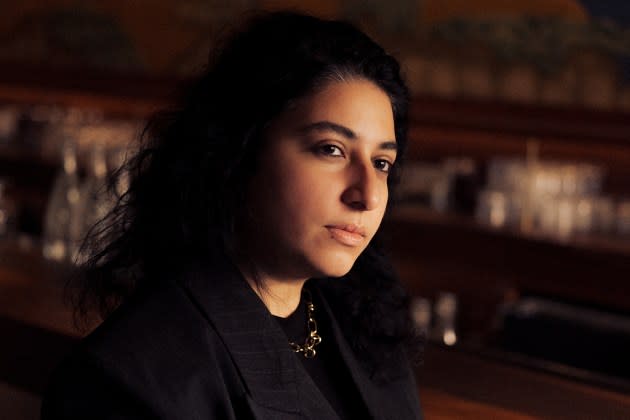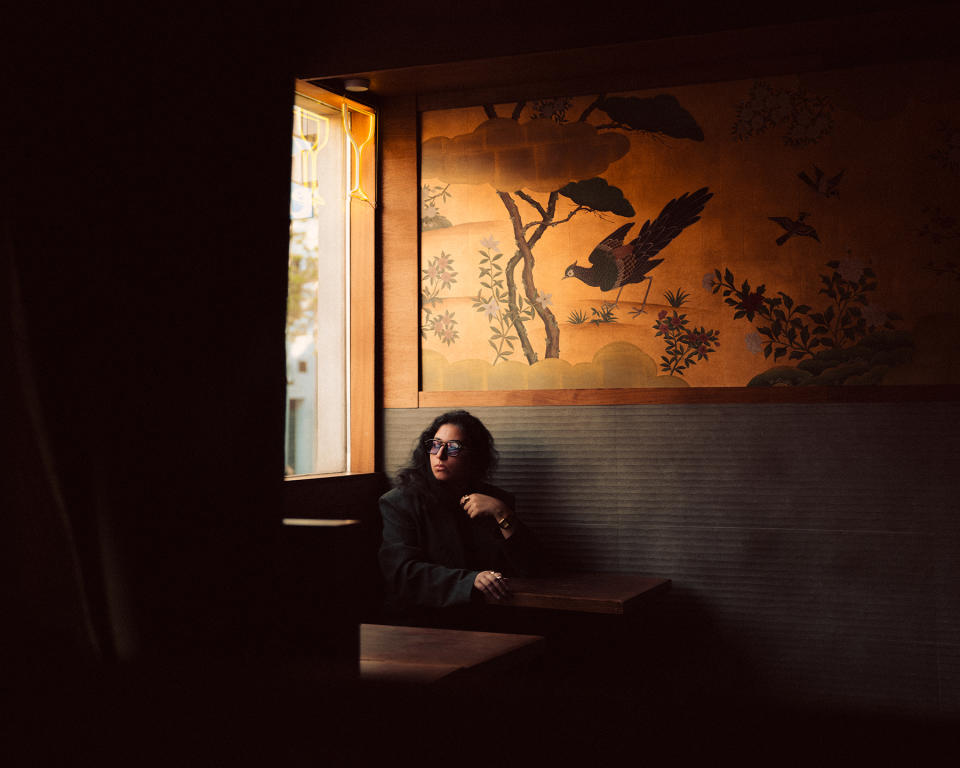Arooj Aftab Just Wants To Have Fun
- Oops!Something went wrong.Please try again later.

We are doing stuff that is indicative of fun,” Arooj Aftab says, quite seriously, in the flat staccato cadence of a test proctor.
The Pakistani-born, Berklee-trained, Brooklyn-based musician is talking about the singing on her new album, Night Reign, out May 31: the doubled vocals, the fresh harmonies, and especially the Auto-Tune that envelops her voice on lead single “Raat Ki Rani” and lends it that spectral pop aura. Aftab remembers asking the mix engineer, “Can you please put, like, T-Pain amounts of Auto-Tune on this and let’s see how it sounds?”
More from Rolling Stone
Tessa Thompson Brings Night-Blooming Romance to Arooj Aftab's 'Raat Ki Rani' Video
Best New Artist Nominee Arooj Aftab Covers Rosalía's 'Di Mi Nombre' for Spotify Singles
Best New Artist-Nominated Arooj Aftab Shares New Song 'Udhero Na'
She and her engineer were “horrified” at how much they liked it.
“So I was like, ‘Fine, let me have my Cher/James Blake/Imogen Heap/T-Pain moment,’” Aftab, 39, continues. “I want people to know that this is not just a place to park your sadness, this is not something to just meditate to — ‘Oh, Arooj, it’s soooo transcendent.’ Please, that’s so boring.”
It’s a late afternoon in early May, and Aftab and I have spent the past hour in a Brooklyn bar that specializes in Japanese whiskey, a spot selected as a not-so-subtle nod to her song “Whiskey,” another highlight of Night Reign. The assumption was that we might sample the wares as we talk, but we ruin the bit by both choosing to abstain. Aftab opts for iced coffee, and I am happy to stick with water. It may be after 5 p.m., and the post-work crowd shuffles in as we chat, but the sun is still high and mighty, stretching through the big, lone window all the way to the back of the bar where we’re seated. Night feels far away.
The assumptions and expectations that Aftab wanted to upend with her new album stem from her celebrated 2021 effort, Vulture Prince. It was a remarkable record, largely about grief, made after the 2018 deaths of a close friend and Aftab’s younger brother. She spent years working on the album, trying to “unlock this mystery of a sound” stuck in her head. Working primarily with guitar, upright bass, and lots of harp, Aftab composed songs that explored jazz, South Asian classical, and folk music, pairing them with original lyrics and verses pulled from Urdu ghazals, a kind of poetry steeped in longing.
Vulture Prince propelled Aftab from professional-artist-with-a-day-job to Grammy-winner — she was the first ever Pakistani artist to win one — with prominent placement on Barack Obama’s summer playlist. Her team grew with her stature; she signed to Verve, and spent the next few years touring the world in support of both Vulture Prince and her 2023 collaboration with Vijay Iyer and Shahzad Ismaily, Love in Exile. In the midst of all this came the inevitable rumblings from everyone around her: “Oh my god, the follow-up!”
“I was really worried about this being the Vulture Prince follow-up, and it needing to be better, or at least the same… or at least it really needs to not suck,” Aftab says with a laugh. “You know, when you have a record that people really love, you’re kind of fucked, because the next one has to be equally good or better. And that’s really scary. My mind was preoccupied with how to take the sound further.”
She continues: “When you blow up, your cute art becomes a small business. You’re not just writing about your feelings anymore. It means a lot more, the stakes are higher. The artist employs pretty much everybody from the managers to the bookers — you’re responsible to then continue to create something good. I wanted to escape it, but then I just got real with it.”

Aftab originally planned to make an album centered around the poetry of Mah Laqa Bai Chanda, an 18th/19th-century courtesan, political advisor, and warrior, who was also the first female Urdu poet to publish a collection of her own work. No one had set her poems to music before, and Aftab was up for the challenge, until it began to feel more like a creative imposition than a stimulating prompt. So she ditched the larger concept, kept what made sense (Chanda’s poems form the basis of two songs, “Na Gul” and “Saaqi”), and opened herself up to everything.
Night Reign includes interpolations of the jazz standard “Autumn Leaves” and Shamim Jaipuri’s ghazal “Zameen,” made famous by the great Indian singer Begum Akhtar. (“She’s like my Billie Holiday, so I gotta have my girl in there,” Aftab says.) Opener “Aey Nehin” is based on an impromptu poem Aftab saw her friend, the Pakistani actress Yasra Rizvi, recite on Instagram. “There’s a looseness, a fun, and a non-seriousness about it that actually ends up being very beautiful — it’s not contrived at all,” Aftab says. “It’s one of my favorite songs on the record.”
Aftab pulled a few songs from her own back catalog as well, including “Whiskey,” a song she wrote in college, and “Bolo Na,” which she wrote as a teenager. The latter was “one of those cheesy terrible songs” she thought would remain locked up forever, but then it fit so well with a heavy drum and bass groove, and she’d found new meaning in its adolescent yearning for love: “It’s like, tell me that you love me, you’re leading me on, you’re sending me mixed signals. As a grown-up, everything sucks, the world is insane, it’s all going to shit, we’re in a world war, the planet is dying. So this song is now me just being angry. I’m saying, ‘Tell me if you love me,’ but I know that you’re lying.”
The sound of Night Reign builds upon Vulture Prince, and features many of the same players, including close collaborators like harpist Maeve Gilchrist and bassist Petros Klampanis. Wanting the songs to groove more, she enlisted expert percussionist Jamey Haddad for several songs, and even opened up her heart to her least favorite instrument, the piano. (“It’s fucking so corny,” Aftab groans, before acknowledging that recording and touring a whole album with Iyer, an acclaimed pianist, helped her realize it’s “not so bad.”) Philly poet and artist Moor Mother delivers a guest verse on “Bolo Na,” and if you peruse the credits closely, you’ll spot a casual Elvis Costello feature, playing the Wurlitzer on “Last Night Reprise.”
Costello became a fan after finding Vulture Prince during a period of grieving; he reached out to Aftab and the two quickly became friends: “He’s the cutest, sweetest person,” Aftab says. “Whenever I hang out with him, I’m low-key still freaking out, but he’s such a good guy and it’s nice to see the normalcy in people.”
Aftab is maybe most animated when discussing the thrills and sonic possibilities that come from putting different musicians, with different skill sets and personalities, into a room together — something she came to embrace as a major part of overcoming the pressures of following up Vulture Prince. “People are not going to say ‘No’ if you pick up the phone and call,” she says. “You can expand your sound, you have the access.”
Embracing this kind of confidence in community makes total sense for an extrovert like Aftab. “I love hanging out, meeting new people, and that fuels my creativity,” she says. And there’s no time better for all of that than the night — especially if you’re a musician on tour. “The touring nightlife, even though it’s so chaotic, so hectic, so full of people, I feel there’s a stillness in all of that,” she adds. “I can be alone with my thoughts, I can write, I can be creative somehow. Less than when I’m just back in Brooklyn doing interviews and going to the dentist.”
Three years of intense touring behind Vulture Prince and Love in Exile has changed that a bit. After performing, Aftab now heads straight for the hotel, not because she’s ready to conk out — she’s likely still “so juiced” from the show — but because she knows herself so well: “No one get in my way with a beer, don’t even look at me, because then I’ll hang out and suddenly it’ll be four in the morning, and the next day is gonna suck.”
It was in one such hotel, somewhere in the world, Aftab honestly can’t remember where, that she came up with the melody and hook for a song about a person whose allure is comparable only to fragrant night-blooming jasmine — a flower known in Urdu as “Raat Ki Rani,” which translates to “Queen of the Night.” At first, she wasn’t sure where to take the song next, so she ran it by a couple friends who were both writers and Urdu speakers, but they couldn’t come up with anything either.
Eventually, Aftab just shrugged and figured, “Well, maybe it doesn’t have to go anywhere. It’s like what Nile Rodgers says — we all just want to get to the hook, so let’s get to the hook. The song is just the hook.”
And what’s more fun than a hook? Well, maybe a hook sung with Auto-Tune.
Best of Rolling Stone

